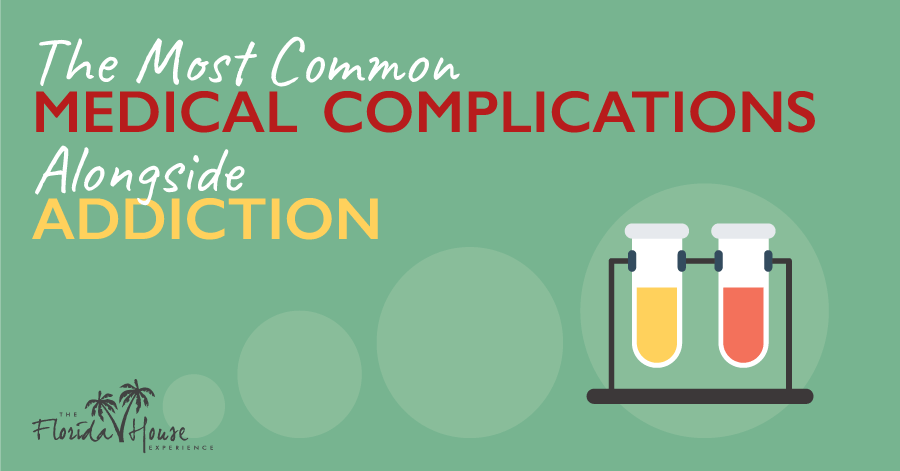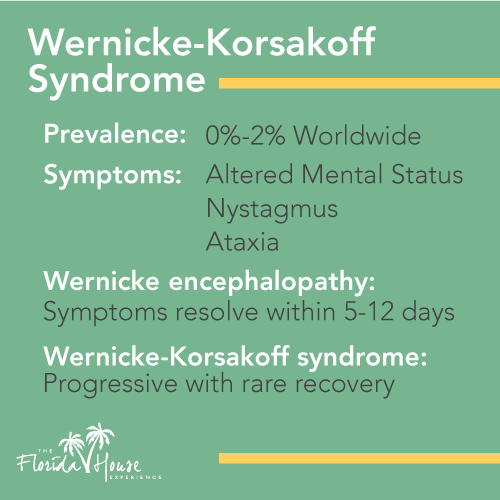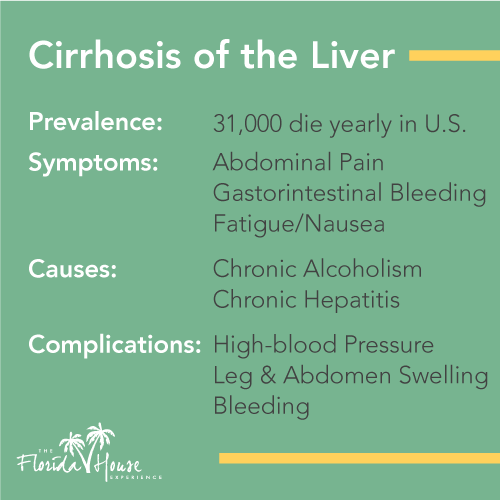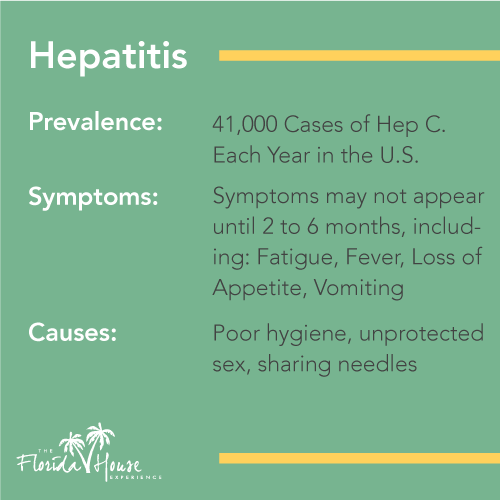
Addiction is a chronic disease affecting your psychological and physical self. An alcohol, heroin, methamphetamine, cocaine or prescription pill addiction detrimentally impacts all physiological systems and may even exact permanent damage to your health. Specifically, certain brain areas and neurotransmitters responsible for supporting hormone release, memory, motivation, executive thinking and impulse control are severely incapacitated by drug and alcohol abuse. In fact, doctors have equated the effect that addiction has on the brain as resembling symptoms suffered by people with a traumatic brain injury.
When an addict is diagnosed with a physical or mental health complication, doctors call this a co-occurring dual diagnosis. Treatment demands medical integration along with the development of an individualized recovery program to delay or reverse the progression of the disease.
Common Health Problems Caused by Alcohol and Drug Abuse
Wernicke-Korsakoff Syndrome
 Many alcoholics will experience a thiamine (vitamin B1) deficiency severe enough to lead to symptoms of Wernicke-Korsakoff Syndrome. Comprised of two distinct
Many alcoholics will experience a thiamine (vitamin B1) deficiency severe enough to lead to symptoms of Wernicke-Korsakoff Syndrome. Comprised of two distinct
disorders — Wernicke’s encephalopathy and Korsakoff’s psychosis — Wernicke-Korsakoff Syndrome causes memory loss, problems with muscle control/coordination, retrograde amnesia, and delusional and/or paranoid thoughts.
When you abuse alcohol, the ability of your body to absorb nutrients properly decreases significantly. Additionally, alcoholics often do not eat enough healthy foods, resulting in malnutrition that expedites thiamine loss.
Wernicke’s encephalopathy damages the hypothalamus and thalamus while Korsakoff’s psychosis damages brain areas regulating memory. Recovering from Wernicke-Korsakoff Syndrome is possible, but it may take years of medication, abstinence and rehabilitative therapy.
Brain Abscess
Addicts who inject drugs can develop brain infections called abscesses as a result of ignoring health problems like dental, ear and skin infections or inflammation of the heart kidneys or lungs. Brain abscesses evolve when infection enters the brain and starts accumulating in brain tissue. Symptoms include high fever, severe headache, seizures, and coma. Having weak immune systems also makes addicts using needles susceptible to systemic infections and brain abscesses.
Stroke
Addiction increases a person’s risk for suffering a stroke as deterioration of brain arteries restricts blood from flowing to the brain. A stroke happens when blood clots formed by pooled blood block blood flow. Without sufficient oxygen, your brain will shut down as neurons start dying within a few minutes of loss of oxygen.
Some of the symptoms of stroke are difficulty speaking and seeing, sudden numbness and weakness on one side of the body and an inability to stand. When addicts are extremely high, they may not even notice signs of an impending stroke and delay treatment. The consequences of not receiving immediate treatment for a stroke include brain damage, paralysis, and coma.
Hepatic Encephalopathy/Cirrhosis of the Liver
 Alcohol abuse will impair liver health. Because the liver is responsible for metabolizing alcohol, liver disease only makes it more difficult for the body to metabolize and eliminate alcohol.
Alcohol abuse will impair liver health. Because the liver is responsible for metabolizing alcohol, liver disease only makes it more difficult for the body to metabolize and eliminate alcohol.
Cirrhosis of the liver is the accumulation of dead liver cells and the inflammation caused by these dead cells. When the immune system senses a rapid loss of liver cells, it responds by initiating inflammation to fight the disease. In addition, scar tissue forms as liver cells continue dying and further contributes to cirrhosis and a badly functioning liver.
Cirrhosis of the liver turns a healthy liver into a thick, stone-like liver that cannot remove toxins from the body. Advanced cirrhosis in alcoholics may lead to hepatic encephalopathy, a possibly fatal brain disorder causing delirium, unstable consciousness and coma.
Early Onset Dementia
According to a study about early onset dementia, younger alcoholics are more vulnerable to early-onset dementia than older alcoholics. This type of dementia presents symptoms similar to those exhibited by people with age-related dementia, such as memory loss, confusion, and fugue states.
Dementia can also affect drug addicts. In some cases, dementia symptoms disappear once the person stops using drugs. In others, drug and alcohol abusers may experience intermittent episodes of dementia even after abstaining for several months. Severe damage to the brain may cause permanent dementia.
Hepatitis
 Liver inflammation caused by viruses or bacteria is called hepatitis. Hepatitis B and C are the most commonly diagnosed types of hepatitis in the United States. Transmission of hepatitis among addicts is mainly through sharing dirty needles or having unprotected sex. Living in dirty conditions and neglecting personal hygiene may also lead to addicts suffering hepatitis.
Liver inflammation caused by viruses or bacteria is called hepatitis. Hepatitis B and C are the most commonly diagnosed types of hepatitis in the United States. Transmission of hepatitis among addicts is mainly through sharing dirty needles or having unprotected sex. Living in dirty conditions and neglecting personal hygiene may also lead to addicts suffering hepatitis.
Left untreated, hepatitis B or C may cause cirrhosis of the liver or liver cancer (hepatocellular carcinoma). The National Institute on Drug Abuse reports an estimated one million people with hepatitis C could die from untreated HCV over the next 50 years.
Seizures
Your brain is an organ running on chemical-electric impulses that shoot constantly throughout the brain and fizzle out once they have been received and interpreted. When drugs, alcohol, infections or other abnormalities interfere with the operation of these chemical-electrical impulses, seizures can occur. Signs of a seizure include vigorous muscle twitching, convulsions, stiffening of the limbs and/or body and lapsing into unconsciousness. Addictions to amphetamines, cocaine, MDMA, and meth are known to produce spontaneous seizures in addicts.
Pregnant Addicts
Using cocaine, methamphetamines, and heroin while pregnant can lead to miscarriage, premature birth or placental abruption, a condition causing the placenta to break away from the uterine wall. Placental abruption induces serious bleeding and possible death for both the baby and the mother. Babies born to mothers who used drugs throughout their pregnancy exhibit smaller head growth, muscle spasms, delayed development and a host of other medical complications.
Fetal Alcohol Spectrum Disorder
Alcoholic pregnant women may give birth to infants with fetal alcohol spectrum disorder (FASD). Characteristics of babies born with FASD include an abnormally smooth, flattened groove between the upper lip and the nose, a thin, almost nonexistent upper lip and eyes that exhibit shortened widths. Additional testing for FASD involves assessment of the infant’s central nervous system, especially the neurological and functional areas responsible for the child’s cognitive and behavioral abilities. Neurological damage may be apparent within an FASD infant’s first hours or days. Epileptic seizures, hearing loss, reduced hand-eye coordination and difficulties sucking are also signs of FASD.
Research into the effects of alcohol on a fetus’ brain indicates children born with FASD suffer from deficits of gray matter, a component of the brain that sends and receives neuronal messages throughout the brain. Without enough gray matter to promote signal transmission and reception, a child with FASD could suffer severe deficiencies in memory, motor functioning, learning, and emotional regulation.
Addiction carries with it a wide range of medical risks beyond those mentioned here. If you are currently suffering from one of these conditions or are concerned you may be seeing these symptoms in a love one, FHE Health is the best solution for your needs. Our medical integration allows us to treat a wide range of medical needs alongside substance abuse. Call our admissions counselors now for more information.






